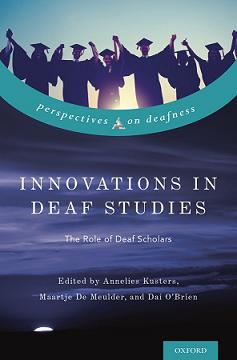Innovations in Deaf Studies: the Role of Deaf Scholars
Temas
Detalles
What does it mean to engage in Deaf Studies and who gets to define the field? What would a truly deaf-led Deaf Studies research program look like? What are the research practices of deaf scholars in Deaf Studies, and how do they relate to deaf research participants and communities? What innovations do deaf scholars deem necessary in the field of Deaf Studies? In Innovation in Deaf Studies: The Role of Deaf Scholars, volume editors Annelies Kusters, Maartje De Meulder, and Dai O'Brien and their contributing authors tackle these questions and more. Spurred by a gradual increase in the number of Deaf Studies scholars who are deaf, and by new theoretical trends in Deaf Studies, this book creates an important space for contributions from deaf researchers, to see what happens when they enter into the conversation. Innovation in Deaf Studies expertly foregrounds deaf ontologies (defined as "deaf ways of being") and how the experience of being deaf is central not only to deaf research participants' own ontologies, but also to the positionality and framework of the study as a whole. Further, this book demonstrates that the research and methodology built around those ontologies offer suggestions for new ways for the discipline to meet the challenges of the present, which includes productive and ongoing collaboration with hearing researchers. Providing fascinating perspective and insight, Kusters, De Meulder, O'Brien, and their contributors all focus on the underdeveloped strands within Deaf Studies, particularly on areas around deaf people's communities, ideologies, literature, religion, language practices, and political aspirations.





